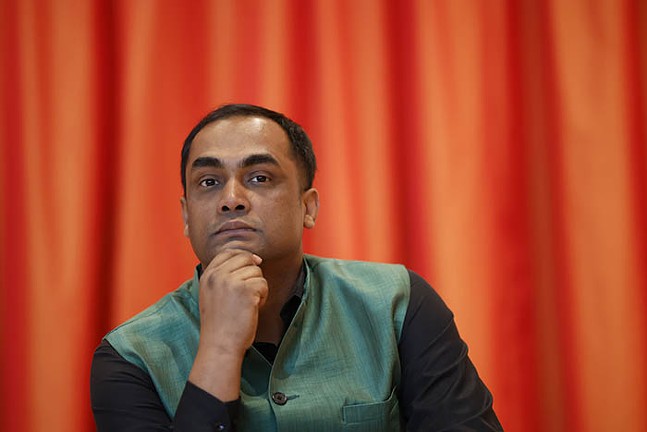I am an immigrant writer from Bangladesh living in Pittsburgh. I was forced to flee my home because my works angered extremist Islamist political groups that oppress religious minorities. I was raised in a Hindu family and come from a long tradition of resistance that also helped birth International Mother Language Day. While it is celebrated widely in Bangladesh, it’s largely overlooked elsewhere around the world. I want to change that.
In 1947, when the Indian subcontinent was divided into India and Pakistan on the basis of religion, the country we know today as Bangladesh was part of Pakistan — yet it was cut off from the nation’s western portion by 1200 miles of the newly independent Republic of India. East Pakistan, as it was known, gained independence after winning the Liberation War in 1971, taking the new name, Bangladesh.
Though the majority of people in Pakistan and East Pakistan shared a common religion (Islam), there were also great cultural, linguistic, and political differences.
In 1948, Pakistan declared Urdu to be the language of East Pakistan, resultng in the start of the Bengali Language Movement, as Bengalis wanted to preserve their rights and official use of their mother tongue. On Feb. 21, 1952, the Pakistani police, under orders from the government, shot and killed several Bengalis in East Pakistan in response to the Bengali Language Movement.
Since then, my fellow countrymen have commemorated Feb. 21 by organizing social gatherings in honor of our language and culture, arranging rallies, leaving flowers at the monuments for the language martyrs, holding literary competitions, drawing folk art on the roads, listening to songs, and going to book fairs.
Recognizing the significance of this national holiday observed in Bangladesh for over 50 years, two Bengalis in Canada wrote to UN Secretary-General, Kofi Annan, in 1998 requesting action to preserve and protect the world’s languages. Their appeal quickly gained attention, and in 1999, International Mother Language Day was declared by both UNESCO and the UN, thus providing a way to promote linguistic and cultural diversity and multilingualism.
Though International Mother Language Day began in Bangladesh, far away from our beloved Pittsburgh, its story is unique and inspiring. Despite the recognition of this holiday, there are still many other languages and cultures that are endangered and threatened; the essence and need for International Mother Language Day are still relevant and universal in order to further ensure freedom of expression. The meaning of this day needs to be told and shared to show the importance of keeping alive and celebrating home languages. The newer generations of immigrant families need to know about their native tongues, heritage, and roots.
Locally, people might be surprised to know there are more than 82,935 people in Allegheny County who speak a language other than English at home (2020 Census); according to PublicSource, in Pittsburgh Public Schools, students speak more than 95 different languages, including Nepali, Swahili, Arabic, and Spanish.
While living in exile, I have begun collecting International Mother Language Day vintage items, such as stamps, envelopes, brochures, postcards, and paper currency from around the world, including from Bangladesh, Mexico, Algeria, China, the Netherlands, and Bosnia-Herzegovina. Now, I am researching and creating a project showcasing a series of postcards based on International Mother Language Day. In the future, I hope to share my collection and ideas with others in the United States and tell or write their inspiring stories in detail.
International Mother Language Day should be recognized here in the Greater Pittsburgh area, as this will bring more awareness to the many other languages spoken and cultures practiced amongst us. Local schools, libraries, universities, freedom of expression organizations, nonprofits that provide translation services, and other educational institutions can collaborate and take a leading role to celebrate this day.
A full day of programming could include storytelling for kids, bilingual folktales, alphabet art projects, poetry readings, conversation salons, and singers performing in a range of languages.
To provide historical context, there could be a presentation and photo exhibition about the Bengali Language Movement. For accessibility, ASL interpretation can be provided along with simultaneous translations into different languages. Local artists could produce powerful quotations in different alphabets.
As someone from Bangladesh, I am clearly passionate about this holiday. I observed it for many years before coming to Pittsburgh, and since I am unable to return home to join the celebrations there, it would mean a lot for me to help others in the local community understand the importance of multilingualism, as it can be a bridge for us to better communicate and understand each other. I want the youth of Pittsburgh, regardless of the languages they speak, to be proud of their diversity and not shy away from maintaining their native cultures. I hope adults in our communities will continue to speak their first languages and share the legacies of their ancestors. Putting International Mother Language Day on the stage in Pittsburgh, will illuminate the strengths of our past identities and multicultural futures.
Tuhin Das is a writer who has published eight poetry books in his home language, Bengali. In 2022, his first English book in the US, Exile Poems, was published by Pittsburgh-based press Bridge & Tunnel Books.


